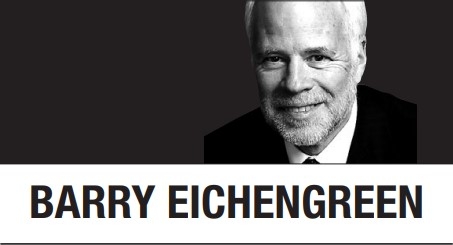
US President Donald Trump’s trade war resembles nothing so much as UK Prime Minister Margaret Thatcher’s Falklands War in 1982: One side deploys massive force, and the other withdraws with its tail between its legs.
Of 57 countries and territories included in Trump’s “Liberation Day” list of targets for “reciprocal” tariffs, just three — Brazil, Canada and China — are credibly threatening retaliation against the United States. The Heard and McDonald Islands, populated only by penguins, were understandably supine. But it is more than a little surprising that so many others have taken US aggression lying down, given expectations of tit-for-tat retaliation.
The European Commission’s agreement with the US is especially stunning in this respect. The Commission has accepted Trump’s 15 percent baseline tariff, with exemptions only for aircraft parts, critical minerals and a couple of other items. US duties on steel, copper and aluminum remain at 50 percent. European Commission President Ursula von der Leyen has pledged that Europe will buy additional US energy and invest $600 billion in the US, although it is questionable whether such commitments are in fact within the Commission’s remit.
The Trump administration claims further that Europe will import more agricultural goods and loosen its restrictions on digital trade. In return, the EU receives basically nothing, only a US promise not to impose still higher tariffs, at least for now. Moreover, the deal enhances US exporters’ access to European markets, while Europe’s exporters face additional barriers in the US. Von der Leyen hails this agreement as putting an end to an extended period of tariff uncertainty, although for how long greater certainty lasts remains, well, uncertain.
The outcome is widely seen as a sign of the EU’s weakness, and there is more than a little merit to this view. The Commission had to negotiate an agreement on behalf of 27 countries with different positions on how aggressively Europe should respond. In France, there was considerable support for the idea that it was important to face down a bully. In Germany, by contrast, policy was shaped by automotive and machinery industries desperate to retain access to the US market on terms at least not grossly inferior to those obtained by Japan, South Korea and the United Kingdom. These differences left the Commission with little wiggle room.
Then there is the fact that the EU continues to rely on the US for weaponry, and that it needs America’s help in supporting Ukraine. Europe recognizes this vulnerability and is seeking to build up its defense and geopolitical capacities independent of the US. But substantial progress in this direction will take years.
Europe likewise lacks a pressure point analogous to China’s control of rare earth refining, which allows the Chinese government to threaten targeted retaliation by cutting off an essential input required by US high-tech industries and by the country’s defense complex.
Finally, like other economies contemplating how to respond, Europe faces a “madman” problem. Normally, the strongest argument for retaliating is to deter further aggression. A rational leader will understand that launching a trade war, much like launching a conventional war, will provoke a counterattack in which his country suffers as much as his opponent’s.
But this strategy works only when leaders are rational. Trump’s trade-policy decisions are clearly guided by an irrational belief in tariffs — “the most beautiful word in the dictionary,” as he puts it — and by the perverse satisfaction he derives from punishing opponents and even allies, regardless of the costs to the US itself. Negotiators, not only in Europe, had good reason to fear that Trump would meet retaliation with retaliation, resulting in escalation and further damage.
There is, however, a contrary view that Europe has shown strength, not weakness, in its response to Trump’s trade war. Meeting tariffs with tariffs, especially when these have no deterrent effect, is simply a way of shooting oneself in the economic foot. Higher import prices fuel inflation and hurt consumers, and taxing imported inputs, as the US is doing, makes domestic production more costly and less efficient. At the same time, less import competition encourages rent seeking: Domestic producers will lobby for tariff concessions and make campaign contributions to obtain them.
Thus, Europe has shown its wisdom in shunning self-destructive measures. It now needs to follow up by ratifying its free trade agreement with Latin America’s Mercosur bloc, solidifying its trade relations with China, and recommitting to the multilateral trading system, whether the US participates in it or not.
Something else that Trump’s trade war and Thatcher’s Falklands War have in common is their utility in distracting attention from their instigators’ domestic problems — in Thatcher’s case an unemployment crisis, and in Trump’s the questions about the extent of his ties to the convicted pedophile Jeffrey Epstein, who hanged himself while awaiting trial on federal sex-trafficking charges.
Helped by her victory in the South Atlantic, Thatcher would reign for eight more years. The US constitution prevents Trump from serving as president until 2033. Or so we are led to believe.
Barry Eichengreen
Barry Eichengreen, a professor of economics and political science at the University of California, Berkeley, is the author, most recently, of “In Defense of Public Debt” (Oxford University Press, 2021). The views expressed here are the writer’s own. — Ed.
(Project Syndicate)
khnews@heraldcorp.com
![[Barry Eichengreen] Trump in the Falklands](https://www.europesays.com/wp-content/uploads/2025/08/news-p.v1.20250813.a3871433fb2942c597c102c3ec8f87d9_T1.jpg)